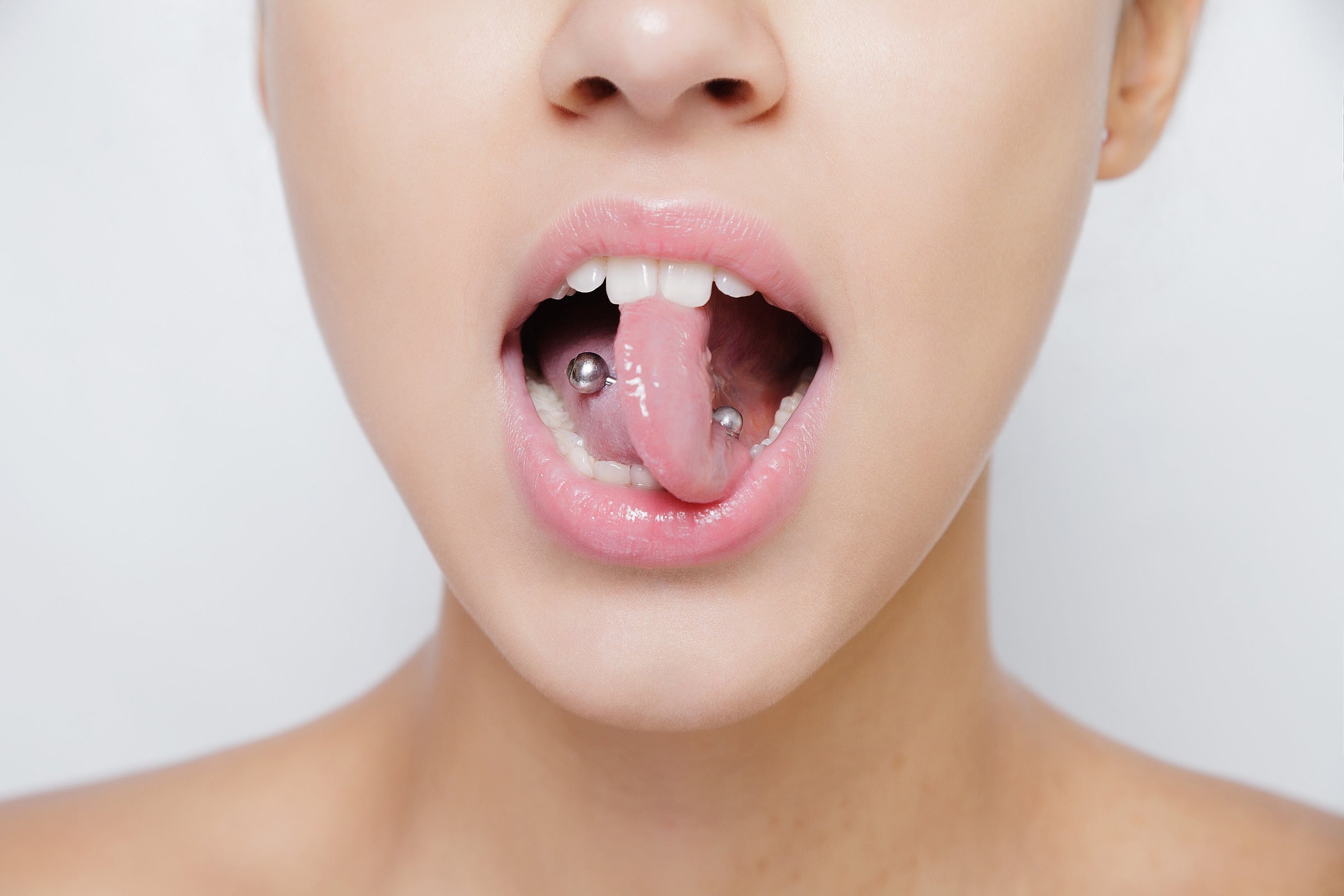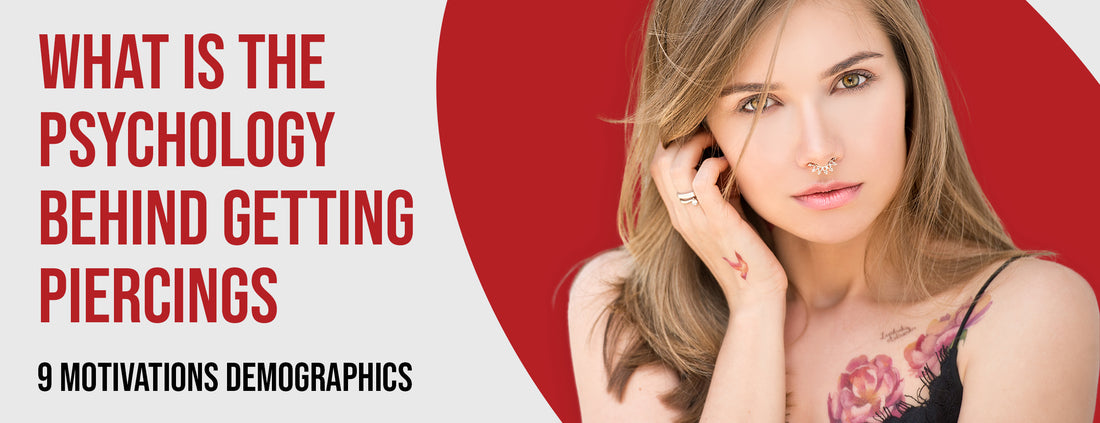Most people enjoy having autonomy over their bodies and decorating them as they see fit. The psychological experience behind the piercing is more appealing than the physical act of the piercing itself.
It is intriguing to think about what makes people decide to get one. There are psychological motivations behind getting piercings that often go unnoticed or disregarded. So, what is the psychology of getting pierced?
In this blog post, we will explore the psychological motivators behind body piercings and the prevalence and demographics of people with piercings.
What is the Psychology Behind Getting Piercings: 9 Motivators

The psychology behind getting piercings is a fascinating topic that sheds light on people's motivations for modifying their bodies. We will explore the various psychological factors behind body piercings and dive into some survey results on the matter.
To Express Oneself
Many people get piercings to express their unique personality and uniqueness. This can include choosing less common piercings or wearing jewelry that reflects their style.
- Types of Piercings to Express Individuality: Uncommon ear piercings, facial piercings, genital piercings, tongue piercings, dermal piercings, etc.
- Survey Results on Individuality as a Motivator: A survey of college students found that over 60% of the participants believed getting a piercing was a way to express their individuality.
To Enhance Attractiveness & Sexuality
Body piercings can also be seen as a way to enhance one's attractiveness and sexuality. Some piercings are thought to be incredibly alluring or to enhance sexual pleasure.
- Types of Piercings to Enhance Attractiveness & Sexuality: Nipple piercings, genital piercings, tongue piercings, etc.
- Survey Results on Attractiveness & Sexuality as a Motivator: A study found that over 80% of participants reported that getting a piercing improved their self-esteem, and 60% felt a sense of heightened attractiveness and sexuality.

For Love of the Art
For some people, getting a piercing is a way to appreciate the art and aesthetics of body modification.
- Types of Piercings for Artistic Purposes: Different types of ear, facial, and body piercings accompanied by creative jewelry designs.
- Survey Results on Artistic Motivation: A survey revealed that almost 15% of participants got a piercing just because they liked the aesthetic appeal or artwork behind a particular piercing.
To Create a Personal Narrative
Body piercings can also be a way to tell a personal story or symbolize a significant event or moment in a person's life.
- Types of Piercings for Personal Narrative Creation: Celtic piercings, Industrial piercings, septum piercings, etc.
- Survey Results on Narrative Creation Motivation: A study found that about 25% of participants with body piercings got them to symbolize a significant life moment or experience.
To Develop Physical Endurance

Piercings can also be viewed as a physical challenge or endurance test.
- Types of Piercings for Endurance Enhancement: Nipple piercings, tongue piercings, genital piercings, etc.
- Survey Results on Endurance Development as a Motivator: A survey revealed that less than 10% of participants agreed to be pierced for endurance development.
To Show Affiliation or Commitment
A body piercing can also indicate membership in a particular group or express commitment to a specific cause or belief.
- Types of Piercings for Affiliation or Commitment: Tongue piercings, industrial piercings, nose piercings, etc.
- Survey Results on Affiliation/Commitment Motivation: A study found that over 30% of participants got piercings to show affiliation to a particular group, community, club, or ideology.
In Search of Spiritual Enlightenment
A piercing can also symbolize spiritual enlightenment or a way to connect with higher powers.
- Types of Piercings for Spiritual Enlightenment: Nose piercings, Monroe piercings, eyebrow piercings, etc.
- Survey Results on Spiritual Enlightenment as a Motivator: About 5% of participants got piercings to feel more spiritual, or about 5% got piercings to feel more connected to their spiritual selves or desired to gain spiritual enlightenment.
As a Sign of Resistance
A body piercing may also be seen as resistance to societal expectations and norms.
- Types of Piercings as a Sign of Resistance: Septum piercings, facial piercings, nipple piercings, etc.
- Survey Results on Resistance Motivation: According to a study, 10% of participants with piercings got them due to a desire to push back against societal norms.

On Impulse or Due to Addiction
Some people get piercings out of impulse or addiction. Some common types of piercings that can fall under this category include:
- Surface piercings.
- Dermal piercings.
- Industrial piercings.
- Tongue piercings.
Survey results have shown that 5% of respondents stated they got piercings because of addiction or impulse. This motivation indicates that people who get piercings on a whim may struggle with impulse control or addiction issues.
The Psychology Behind Getting Piercings: Demographics
Some people view piercings as a form of self-expression, while others may see them as a way to create a sense of identity or as an act of rebellion against societal norms. We will explore the demographics of people with body piercings to better understand the psychology behind this phenomenon.
Age of People with Body Piercings
Body piercings are a trend that transcends age, with people of all ages sporting various piercings. Certain age groups are more likely to get piercings than others. According to statistics, younger people have more piercings than older people. Some interesting facts regarding the age of people who have body piercings include:
- The average age for a first piercing is 18 years old.
- 83% of people between 18 and 29 have at least one piercing.
- Piercings become less common as people age. At least one piercing is only worn by 14% of people over 50.
Gender of People with Body Piercings

Gender is another factor that plays a role in the prevalence of body piercings. Historically, piercings were mainly associated with women, but men have also embraced this trend recently. Here are some facts about the gender of persons with piercings:
- 72% of women have piercings compared to 55% of men.
- Women are more likely to have piercings in their ears, while men have piercings on other parts of their bodies.
- Men with piercings tend to have more piercings than women.
Socioeconomic Status of Persons with Body Piercings
While piercings are becoming increasingly popular, they are not accessible to everyone. The cost of piercings and cultural norms and stigmas can make piercings more prevalent amongst certain socioeconomic groups. The following are some facts about the socioeconomic status of a person with piercings:
- People with higher incomes have more piercings than those with lower incomes.
- Piercings may be more prevalent in certain subcultures or communities.
- The mainstreaming of piercings has led to affordability and accessibility for everyone across all socioeconomic statuses.

Conclusion
Body piercings have a variety of psychological motivators that influence people's decision to get one. Whether it is to express self-expression, enhance attractiveness, create a personal narrative, or show affiliation or commitment, each person has a unique reason for their decision. It is essential to choose piercings wisely, considering the potential risks and any underlying psychological concerns.
People with piercings and demographics indicate they are a common expression amongst diverse groups. Understanding the psychology behind getting piercings can help us appreciate the significance and meaning behind each piercing and recognize the complex nature of self-expression.










![The Recovery Time and Stages of Nipple Piercings [Best Practices]](http://drnumb.com/cdn/shop/articles/How_Long_Do_Nipple_Piercings_Take_To_Heal__3_Stages_Explained.jpg?v=1714373243)

